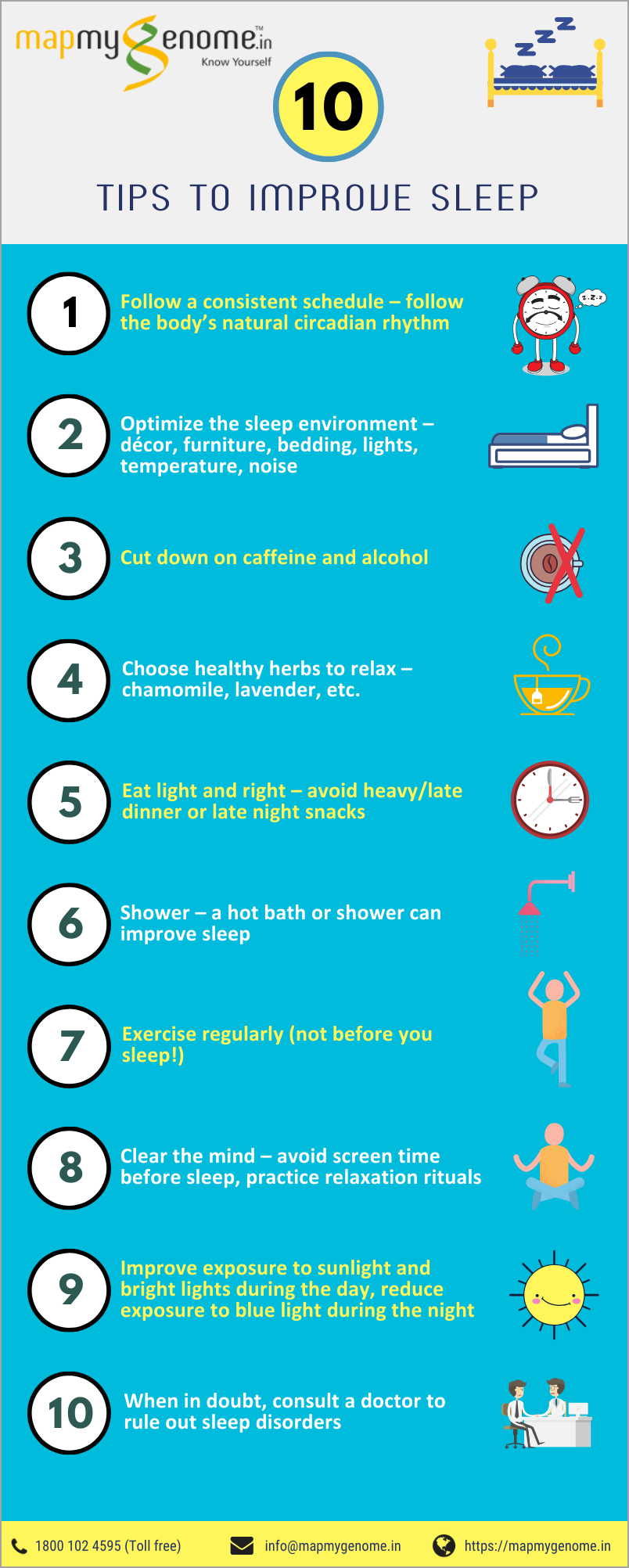Good Sleep For Good Health
Mar 13, 2020
5101 Views
We all have that family member who reminisces about the “golden days” of the past – when early to bed and early to rise was the norm, when a post-lunch siesta was not a luxury, and when people did not know what to do with their free time. In today’s fast-paced world, few of us follow this mindset. We seek to add more hours to our day – for work and for play. Bingeing is common – be it on work or on hobbies. We may not be willing to compromise on our goals or happiness, but we are so willing to compromise on our sleep. Limited sleep and unlimited caffeine help us get through our week, while social activities or hobbies ensure sleepless nights during the weekends. It is World Sleep Day today — a day to remind ourselves of the importance of sleep in our lives.
Am I Sleep Deprived Or Sleep Deficient?
For many of us, the answer is a big YES. Health experts recommend 7-9 hours of sleep for healthy adults. For many of us, that is an impossible goal. Many factors may contribute to this:
- We don’t get adequate sleep — due to limited time or lifestyle choices
- We are not in sync with our biological clocks
- We don’t sleep well or according to our bodies’ needs
- Some medical problems such as stress or sleep disorders may affect our sleep
- Some medications may interfere with sleep
Sleep deprivation and deficiency contribute to sleep debt, which can have many long-term and short-term consequences.
Read: Lifestyle Disease: Prevention and Risk Reduction
Why Is Sleep So Important?
Our ancestors were absolutely right when they declared that early to bed and early to rise makes a man (or a woman) healthy, wealthy, and wise. Let us find out how.
Healthy Sleep = Healthy DNA
As a member of a genetics team, I should probably start with genetics first. DNA damage can occur due to several factors and this damage can accumulate. While some studies suggest that sleep is restorative and can reduce the cumulative damage, some others suggest that disruption and deprivation can contribute to the damage (Cheung et al, 2019).
Sleep Healthy To Fight Obesity
The production of appetite-regulating hormones such as leptin and ghrelin are linked to our sleep habits (Taheri et al, 2004) – sleep more to eat fewer calories. Many studies link sleep deficiency to obesity – if our genes put us at a higher risk for obesity, let us not waste our sleep on it.
Sleep Healthy To Prevent Disease
Several studies suggest that on-going sleep deficiency can increase the risk of diabetes, hypertension, stroke, heart disease, and kidney disease.
Sleep Healthy To Fight Germs
Good sleep is a key to a good immune system, according to studies (Irwin 2002). To beat the flu or Coronavirus, first sleep well.
Sleep Like A Baby To Make One
Fertility experts suggest that regular disruptions in sleep cycles have a negative impact on reproductive hormones and can increase the risk for infertility (Kloss et al, 2015).
A Good Gut Needs Good Sleep
Good sleep can help fight inflammation. Gastroenterologists across the globe recommend good sleep to ward off inflammatory bowel disease (Ranjbaran 2007).
Sleep To Be A Better Athlete
Our athletic performance depends on not only our genes, diet, and training but also on our sleep cycle (Fullagar 2015). Researchers suggest that improved sleep can enhance performance intensity, coordination, and speed, while promoting muscle repair.
Sleep For The Brain To Catch Up
Like our genes, our sleep patterns too have an impact on our learning, memory, cognition, concentration, and productivity (Ellenbogen 2005). Like my grandma says, how can you focus without a good night’s sleep? There are so many experts on LinkedIn, who claim that the problem for today’s people is not time management, but focus management (there are so many people who claim ownership to this idea, that citing the original author is not easy).
Sleep For Mental Health
Chronic sleep deficiency is associated with depression and anxiety, even in children (Chorney et al, 2008). Good sleep is essential for our mental health.
Good Sleep For A Healthy Libido
Sleep deprivation has been linked to lower libido and interest in sexual intercourse (Christian 2005).
Good Sleep Can Boost Emotional and Social Intelligence
It is so much more difficult to be empathic or cheerful when we are sleep deprived. Researchers have proven that the facial responsiveness to emotional stimuli is impaired by poor sleep (Shwarz et al, 2013).
Good Sleep Is A Good Investment
Good sleep is an important investment for our health and safety (Gregory 2008). So many accidents occur due to sleep deprivation.
Read: Health Is Wealth – Get Richer Everyday!
How Can We Improve Sleep Quality?
As important as it is to ensure good sleep, we know that it is not always easy. Some lucky people fall asleep as soon as their head hits the pillow. Others may take a while and the sleep quality may not be good. Here are some tried and tested tips to improve sleep:

What Makes Us The Experts On This Topic?
At Mapmygenome, we offer personalized health solutions to enable our customers to achieve their health goals. In addition to the genetic findings, our experts review health history and habits before offering choices to improve patient outcomes. During genetic counseling sessions, our genetic counselors often encounter people with sleep deprivation. Pooja Ramchandran, India’s pioneering genetic counselor and our VP Genetic Counseling, shares her expertise:
Most people are amused (and immensely frustrated) when they experience issues related to something as basic and necessary as sleep. Sleep shouldn’t have to be a struggle, but our habits can sometimes make it challenging for us to get sufficient and regular sleep. I usually tell patients to prioritize their health. Sleep is an important part of good physical and mental health — it’s when our body does all the fixing, healing, and recuperating. And my advice to folks is to give their bodies the time it needs to keep us in good working condition. Sleep hygiene is a major discussion — fix a bedtime and waking up time; don’t use your bedroom for eating, gadget time, watching TV, etc.; reserve the bed for the 3 S’s- sleep, sex, sickness; minimize the use of electronics just before bedtime. I help people identify their personal facilitators and barriers of sleep hygiene, and we make a realistic plan to help achieve their sleep goals. I definitely ask them to sleep on it.
How Can We Help You?
Our focus is on healthy habits and proactive participation to improve individuals’ health outcomes. With one simple test, you can build a healthy life. To learn more, visit https://mapmygenome.in, write to info@mapmygenome.in or call 1800-102-4595! Today!
Works Cited
- Cheung, V., et al. “The effect of sleep deprivation and disruption on DNA damage and health of doctors.” Anaesthesia 74.4 (2019): 434-440.
- Chorney, Daniel B., et al. “The interplay of sleep disturbance, anxiety, and depression in children.” Journal of pediatric psychology 33.4 (2008): 339-348.
- Duffin, Christian. “Lack of breaks leaves nurses burnt out: many nurses experience loss of libido, poor sleep and constant exhaustion, a Nursing Standard survey has shown.” Nursing Standard 20.6 (2005): 16-17.
- Ellenbogen, Jeffrey M. “Cognitive benefits of sleep and their loss due to sleep deprivation.” Neurology 64.7 (2005): E25-E27.
- Fullagar, Hugh HK, et al. “Sleep and athletic performance: the effects of sleep loss on exercise performance, and physiological and cognitive responses to exercise.” Sports medicine 45.2 (2015): 161-186.
- Gregory, James M. “Sleep: a good investment in health and safety.” Journal of agromedicine 13.2 (2008): 119-131.
- Irwin, Michael. “Effects of sleep and sleep loss on immunity and cytokines.” Brain, behavior, and immunity 16.5 (2002): 503-512.
- Kloss, Jacqueline D., et al. “Sleep, sleep disturbance, and fertility in women.” Sleep medicine reviews 22 (2015): 78-87.
- Ranjbaran, Ziba, et al. “Impact of sleep disturbances in inflammatory bowel disease.” Journal of gastroenterology and hepatology 22.11 (2007): 1748-1753.
- Schwarz, Johanna FA, et al. “Shortened night sleep impairs facial responsiveness to emotional stimuli.” Biological psychology 93.1 (2013): 41-44.
- Taheri, Shahrad, et al. “Short sleep duration is associated with reduced leptin, elevated ghrelin, and increased body mass index.” PLoS medicine 1.3 (2004).

